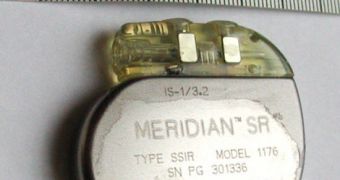In a groundbreaking first, a scientist managed to infect himself with a computer virus. The malicious code took refuge in a chip that Mark Gasson, a researcher at the University of Reading, had placed in his hand. From this location, the virus was transmitted to a computer in the scientist's lab, from where it could have spread in a local network, and then on the Internet. The code could have also been transmitted into building access cards, and in other computers at the location. The experiment was controlled, but it raises important question marks as to the security of future medical implants.
As pacemakers and RFID chips begin to be used more and more, and to become increasingly advanced and high-tech, researchers are beginning to wonder how people will stay safe from the action of viruses that could make their way into these electronic devices. If a hacker manages to gain access into a patient's pacemaker, then basically he or she would control that person's life. At a touch of a button, the medical implant would stop, which would oftentimes equal a death sentence for the target. “We should start to think of these devices as miniature computers,” Gasson says, adding that looking at things from this perspective could help avert such nightmarish scenarios.
The chip Gasson had implanted in 2009 is a relatively straightforward one, in the sense that it's not responsible for complex functions. It simply emits a signal, which can be read by access machines. This allows the researcher to access the lab, and to use his cell phone. Nevertheless, in spite of its simplicity, the chip is capable of harboring viruses, which can then be spread throughout networks. The code the scientists created transferred itself into the reading machine, and then into the building's computer system. “The virus replicates itself through the database and potentially could copy itself onto the access cards that people use,” Gasson reveals, quoted by LiveScience.
“I don’t think for us that [infectious technological agents] would be a particularly new concept, but implants in our bodies will make it a lot more real. A denial-of-service attack on a pacemaker, if such a thing were possible, would of course be very detrimental,” the expert adds. He reveals that in the future bionic devices will play an even more important role in the lives of people. Artificial implants will be used to boost IQ and other brain functions, and the cortex has long-since been hailed as the final frontier for hackers. Undoubtedly, as such implants become available, hackers will attempt to breach their security and control the people wearing them.

 14 DAY TRIAL //
14 DAY TRIAL //